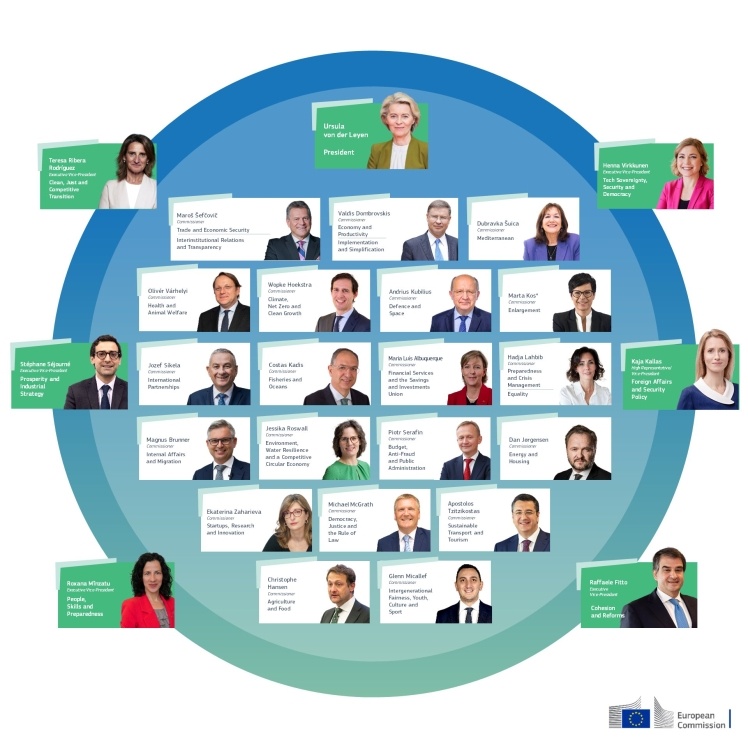The President of the European Commission, Ursula von der Leyen, presented the final list of candidates for the positions of European Commissioners.
She reported this on the social network Kh.
Former Prime Minister of Estonia Kaja Kallas is applying for the post of the EUʼs chief diplomat. During her premiership, Estonia supported Ukraine in every possible way in the fight against Russiaʼs full-scale aggression and maintained a firm anti-Kremlin position. In particular, from 2022, Estonia provided military aid to Kyiv in the amount of more than €500 million, or about 1.4% of its GDP.
The representative of Slovenia Marta Kos may become the commissioner for EU enlargement and additionally be responsible for the recovery of Ukraine, Euronews notes. Previously, the representative of Hungary Oliver Varhelyi was responsible for the enlargement, but due to the countryʼs position on Ukraine, they decided to give him another position in the EC — now he is applying for the position of commissioner for health and animal welfare.
Among other candidates:
- Austria — Magnus Brunner — Commissioner for Internal Affairs and Migration;
- Belgium — Hadja Lahbib — Commissioner for Crisis Preparedness and Management;
- Bulgaria — Ekaterina Zakharieva — Commissioner for Startups, Research and Innovation;
- Croatia — Dubravka Šuica — Commissioner for the Mediterranean;
- Cyprus — Costas Kadiz — Commissioner for Fisheries and Oceans;
- Czech Republic — Jozef Sikela — Commissioner for International Partnerships;
- Denmark — Dan Jorgensen — Commissioner for Energy and Housing;
- Finland — Henna Virkkunen — Executive Vice President for Technological Sovereignty, Security and Democracy, Commissioner for Digital and Border Technologies;
- France — Stéphane Sejournay — Executive Vice-President for Prosperity and Industrial Strategy, Commissioner for Industry, Small and Medium Enterprises and the Single Market;
- Greece — Apostolos Tzitzikostas — Commissioner for Sustainable Transport and Tourism;
- Ireland — Michael McGrath — Commissioner for Democracy, Justice and the Rule of Law;
- Italy — Raffaele Fitto — Executive Vice-President for Cohesion and Reforms, Commissioner for Cohesion Policy, Regional Development and Cities;
- Latvia — Valdis Dombrovskis — Commissioner for Economy and Productivity, Implementation and Simplification;
- Lithuania — Andrius Kubilius — Commissioner for Defense and Space;
- Luxembourg — Christophe Hansen — Commissioner for Agriculture and Food;
- Malta — Glenn Micallef — Commissioner for Intergenerational Equity, Culture, Youth and Sport;
- The Netherlands — Wopke Hoekstra — Commissioner for Climate, Clean Growth and Zero Pollution, also responsible for taxation;
- Poland — Piotr Serafin — Commissioner for Budget, Anti-Fraud and Public Administration;
- Portugal — Maria Luís Albuquerque — Commissioner for Financial Services and Savings and Investments Union;
- Romania — Roxana Minzatu — Executive Vice-President for People, Skills and Readiness, Commissioner for Skills, Education, Quality Jobs and Social Rights;
- Slovakia — Maroš Šefčovič — Commissioner for Trade and Economic Security, Inter-institutional Relations and Transparency;
- Spain — Teresa Ribera — Executive Vice President for Clean, Fair and Competitive Transition, Commissioner for Competition;
- Sweden — Jessika Roswall — Commissioner for Environment, Water Sustainability and Competitive Circular Economy.
Of the 27 European Commissioners, 11 positions can be filled by women. At the same time, women predominate among executive vice presidents — four to two. For a long time, Von der Leyen put pressure on EU countries to nominate women as candidates for European Commissioners, as she sought equal representation of women and men in the EC. However, compared to the previous composition of the EC, the gender ratio has not changed.
Von der Leyen will now send so-called task letters to each candidate, outlining his own vision for their mandate. After that, all candidates must undergo a legal background check, an interview with parliamentary committees and a confirmation vote before they are finally appointed to the new positions.
As Euronews points out, candidates could be quickly rejected if they fail to win the support of the European Parliament, which is more politically divided than during previous mandates. Then the governments of the EU countries will be forced to propose an alternative candidate.
- The European Commission is the highest executive body of the European Union, which roughly corresponds to the role and functions of the government in the systems of nation states. Unlike national governments, the European Commission can also act as a legislative initiative.
- The commission consists of 27 members, including the president and vice president. Although each member is appointed by the national government, one from each EU member state, they do not represent their country in the EC. However, in practice, they sometimes defend the national interests of their countries.
